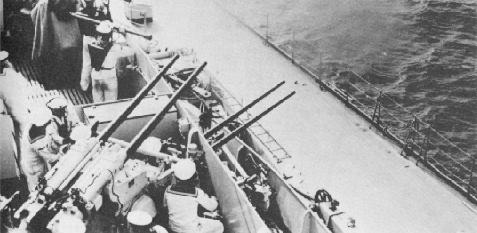This AA weapon was used on every major combatant ship of World War II. It was only capable of semi-automatic firing, with each shell being individually loaded, which made it a rather slow-firing weapon for anti-aircraft defense. For this reason, it was replaced on many ships in the latter part of the war with the 3.7 cm KM42 and 3.7 cm KM43.
In addition to the normal train and elevation axes, the mounting for this weapon had a third axis which stabilized the the gun carriage when the ship rolled or pitched. This allowed the gun to track an airplane without interference from the motion of the ship. However, problems with this mounting led to its abandonment in subsequent designs for 3.7 cm guns.
The 3.7 cm/L83 SK C/30U was designed for use on U-boats and was used on a "wet-mount."
Some quantity of these weapons were exported to Spain.
Used a vertically sliding breech block.
As this was a manually-loaded, single-shot, semi-automatic weapon with a slow rate of fire, the KM started a development program to produce an automatic loader for it. While a prototype was successfully tested, the developmental contract was cancelled in late 1943 as the SK C/30 was becoming obsolete and was already being replaced on naval vessels by the 40mm Bofors and the 37mm KM42 and KM43 naval FLAK guns. In this context it was pointed out that design efforts should instead be focused on more advanced naval FLAK weapons such as the 55mm Gerät 58.
| Designation | 3.7 cm/L83 (1.5") SK C/30 |
|---|---|
| Ship Class Used On | Almost all |
| Date Of Design | 1930 |
| Date In Service | 1934 |
| Gun Weight | 536 lbs. (243 kg) |
| Barrel Length | 121.0 in (3.074 m) |
| Bore Length | 116.5 in (2.960 m) |
| Rifling Length | 100.6 in (2.554 m) |
| Grooves | (16) 0.0217 in deep x 0.187 in (0.55 mm x 4.76 mm) |
| Lands | 0.098 in (2.5 mm) |
| Twist | Increasing RH 1 in 50 to 1 in 35 |
| Chamber Volume | 30.5 in3 (0.500 dm3) |
| Rate Of Fire | about 30 rounds per minute 1 |
- ^Many references show a ROF of 80 rounds per gun per minute (theoretical) and 40 rounds per gun per minute (practical). I believe the above figure, taken from "Naval Weapons of World War Two" to be more accurate.
| Type | Fixed |
|---|---|
| Complete Round Weight | HE-T: 4.63 lbs. (2.1 kg) |
| Projectile Types and Weights 1a | AP-T 2a: 1.64 lbs. (0.742 kg)
HE-T 3a: 1.64 lbs. (0.742 kg) |
| Bursting Charge | AP-T: 0.48 lbs. (0.022 kg) Nitropenta NP 15
HE-T: 0.60 lbs. (0.0274 kg) TNT Fp 02 |
| Projectile Length | 6.4 in (162 mm) 4a |
| Propellant Charge 5a | 0.81 lbs. (0.365 kg) RPC/38N
Cartridge: 2 lbs. (0.97 kg) |
| Muzzle Velocity | 3,281 fps (1,000 mps) |
| Working Pressure | 18.7 tons/in2 (2,950 kg/cm2) |
| Approximate Barrel Life | 7,500 rounds |
| Ammunition stowage per gun | Bismarck: 2,000 rounds
Scharnhorst: 2,000 rounds (later upped to 6,000 rounds) Deutschland: 2,000 rounds (later upped to 6,000 rounds) Admiral Hipper and Prinz Eugen - single: 7,000 rounds Admiral Hipper and Prinz Eugen - twin: 1,500 rounds Königsberg, Liepzig and Nürnberg: 1,200 rounds Z1 - Z47: 2,000 rounds |
- ^Later in the war, there was also a mine round developed for this gun. This had the same good ballistics but carried a more potent 125g HE filler at the expense of reducing the tracer element (1200m instead of 4800m).
- ^AP-T was Psgr. L'spur Zerl.
- ^HE-T was Spgr. L/4,1 Lh 37.
- ^Complete round was 20.3 in (516.5 mm) long.
- ^As originally introduced, these weapons used RPC/32 propellant.
- Tracer burnt for 12 seconds.
| Elevation | Distance |
|---|---|
| 45 degrees | 9,300 yards (8,500 m) |
| AA Ceiling @ 85 degrees | 22,310 feet (6,800 m) - tracer 15,750 feet (4,800 m) |
| Designation 1b | Twin Mounting 2b 3b Graf Zepplin (11), Bismarck (8), Admiral Hipper (6), Prinz Eugen (6), Königsberg (4), Liepzig (4), Nürnberg (4), Destroyers (2) and Torpedo Boats (1): Dopp LC/30 Single Mounting
|
|---|---|
| Weight | Dopp LC/30: 8,090 lb (3,670 kg)
Ein LC/34: About 4,400 lbs. (2,000 kg) Ubts LC/39: 3,200 lbs. (1,450 kg) |
| Elevation | Dopp LC/30: -10 / +85 degrees
Ein LC/34: -10 / +80 degrees Ubts LC/39: -10 / +90 degrees |
| Elevation Rate | Manual Operation, only |
| Train | 360 degrees |
| Train Rate | Manual Operation, only |
| Gun recoil | N/A |
- ^Twin mounts were used by most warships Torpedo Boat size and larger while the single mounts were used mainly by S-boats and small auxiliary warships.
- ^The Dopp LC/30 mounting was manually trained and elevated with direct gyro cross leveling over +/- 19.5 degrees.
- ^Twin mounts had a crew of six on-mount plus ammunition passers.
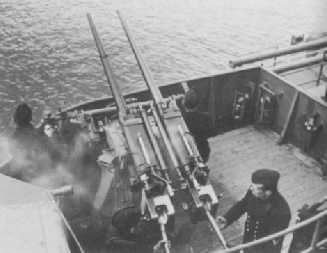
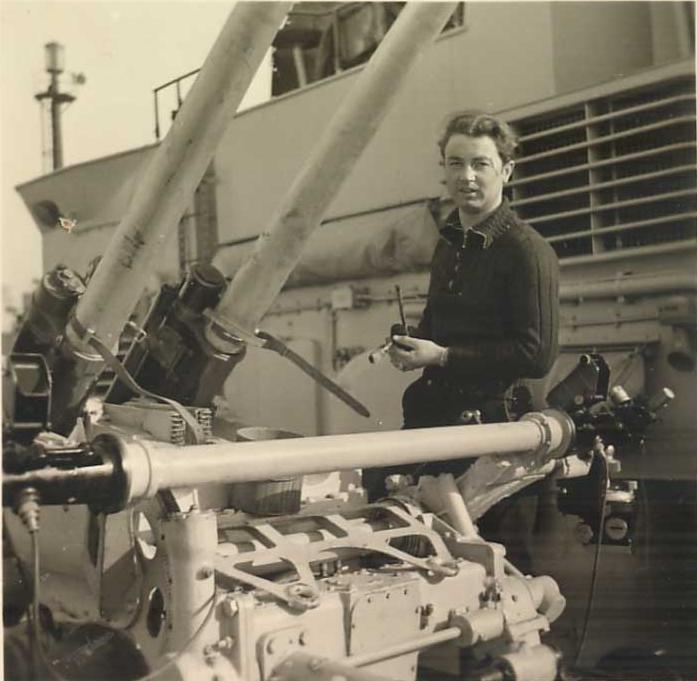


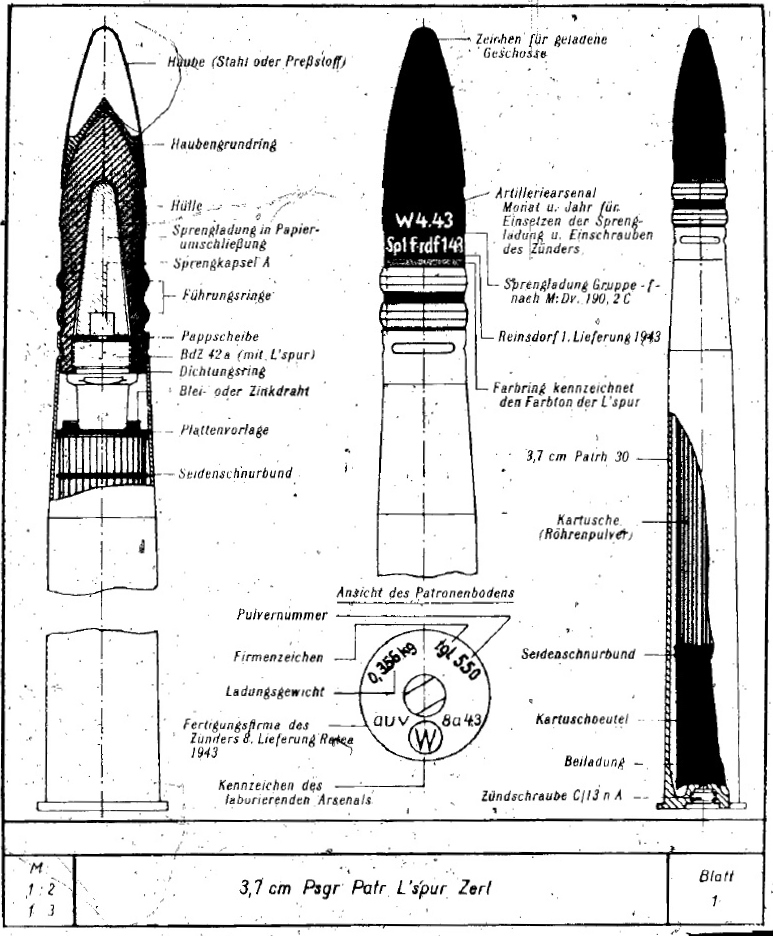
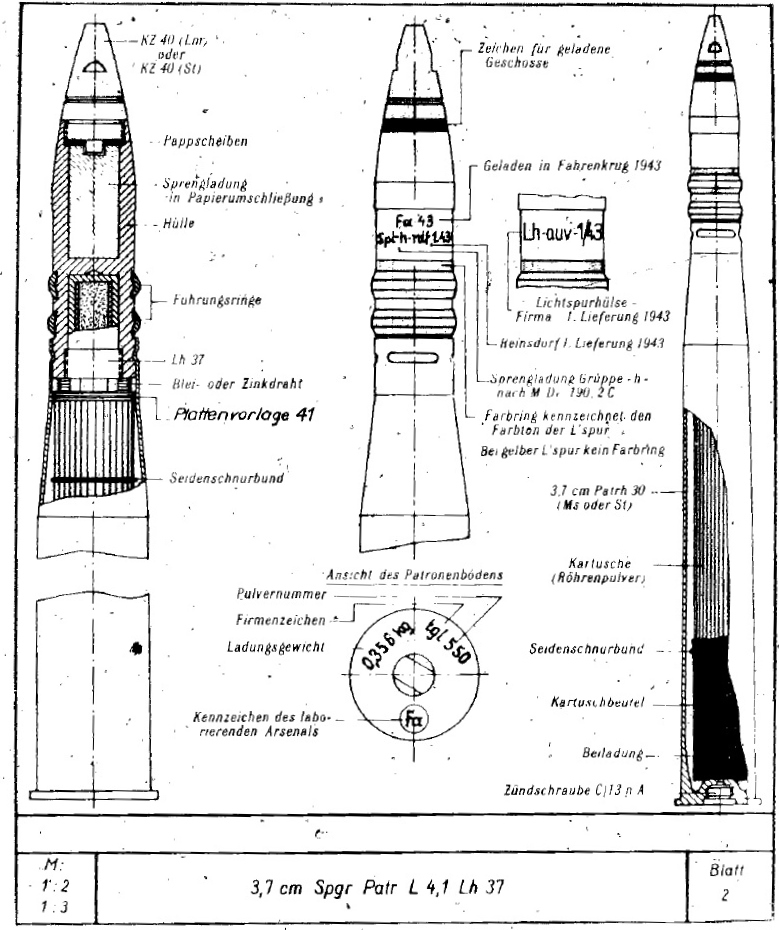
"Naval Weapons of World War Two" by John Campbell
"German Warships 1815-1945" by Erich Gröner
"German Destroyers of World War Two (2nd Edition)" and "German Cruisers of World War Two" both by M.J. Whitley
"Warship Pictorial #21: Kriegsmarine Prinz Eugen" by Steve Wiper
---
"Merkbuch über die Munition für die 3,7 cm SK C/30 in Dopp L C/30, Einh L C/34 u. Ubts L C/39" M.Dv. Nr. 170,3 by Oberkommando der Kriegsmarine
"Unterrichtstafeln für Geschützkunde - Band II Flak: Zusammengestellt bei der 1. Abtlg. S.A.S. 1942" by Oberkommando der Kriegsmarine
---
Special help from Sven Brummack and Thorsten Wahl
22 May 2008 - Benchmark
23 March 2009 - Fixed typographical error, added links to other 3.7 cm AA guns.
09 August 2009 - Added picture of Spr.gr. projectile
30 April 2017 - Converted to HTML 5 format
02 November 2018 - Corrected typographical error
10 March 2019 - Reorganized notes, added dimensional sketch of Dopp L. C/30 mounting and projectile sketches from M.Dv. Nr. 170,3
20 August 2024 - Minor additions

